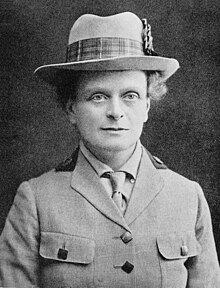John Inglis (civil servant)
His disagreement with Lord Lytton's Afghan policy led to him being passed over for an expected promotion to be Governor of North West Province.
He took early retirement and on his return to Edinburgh, he founded, jointly with his daughter Elsie Inglis, the Scottish Association for the Medical Education of Women.
[1] His father Alexander Inglis, who originated from Kingsmills, Inverness-shire, emigrated to Charleston, South Carolina leaving his son David to be brought up in Scotland by an uncle.
[2] On 29 May 1839, the Principal of the East India College at Haileybury, Charles Le Bas, wrote to Inglis' father: 'It is with unfeigned grief that I have to announce to you, that we have been under the afflicting necessity of rusticating your son for the remainder of the present term.
You will doubtless recollect that, on a former occasion (Nov. 1838), I had the painful duty of inflicting on him ... a solemn Reprimand & Admonition, for joining a late, and very turbulent party, by which much mischief was done, and several students greatly annoyed and molested.
He returned alone to India in 1858 and, working under Sir John Lawrence, Chief Commissioner of the Punjab, was involved in some of the conflicts in the Indian Rebellion, at Najibabad, Bareilly and Rohilkhand.
He remained close to his former mentor Sir John Lawrence and agreed with his ideal that India should become a land 'thickly cultivated by a fat contented yeomanry, each riding his own horse, sitting under his own fig tree and enjoying his rude family comforts.'
With such friends in high places and an unblemished record in India it was anticipated that Inglis would be promoted to be Governor of North Western Provinces.
This proved to be a brutal guerrilla war with much loss of life, and Inglis, regarded as a liberal by his superiors, found himself in disagreement with the policy and out of favour with the higher ranks of the Raj.
He was passed over for this anticipated promotion and decided to retire, aged 56, and return with his family to Edinburgh, where his married daughter Amy had now settled.
George, Hugh and Herbert were sent to school at Eton, Cecil to Uppingham and Ernest to Rugby, while Amy was looked after by relatives.
Elsie Inglis went on to become a surgeon, a prominent figure in the suffrage movement and founded the Scottish Women's Hospitals which saw service behind front lines in the First World War.
